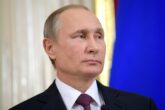September 09, 2019
Great-Power Competition Is Washington’s Top Priority—But Not the Public’s
China and Russia Don’t Keep Most Americans Awake at Night
For all the acrimony in Washington today, the city’s foreign policy establishment is settling on a rare bipartisan consensus: that the world has entered a new era of great-power competition. The struggle between the United States and other great powers, the emerging consensus holds, will fundamentally shape geopolitics going forward, for good or ill. And more than terrorism, climate change, or nuclear weapons in Iran or North Korea, the threats posed by these other great powers—namely, China and Russia—will consume U.S. foreign-policy makers in the decades ahead.
President Donald Trump’s administration has been a prime mover in setting this new agenda. Its National Security Strategy, published in December 2017, portrayed China and Russia as seeking “to shape a world antithetical to U.S. values and interests,” with Beijing displacing the United States in the Indo-Pacific and Russia establishing spheres of influence near its borders. When he presented the new National Defense Strategy in January 2018, then Secretary of Defense James Mattis announced that “Great Power competition—not terrorism—is now the primary focus of U.S. national security.” Secretary of State Mike Pompeo said much the same in April, when he told NATO foreign ministers that the world had entered “a new era of great-power competition,” adding separately that “China wants to be the dominant economic and military power of the world, spreading its authoritarian vision for society and its corrupt practices worldwide.” GPC has become the Pentagon’s newest acronym.
Read the full article in Foreign Affairs.
More from CNAS
-
Trump’s Crackdown on Foreign Students Is a Gift to China
When top global talent no longer sees America as a stable, long-term bet — in light of both visa and research funding insecurity — many will vote with their feet....
By Jordan Schneider
-
Trump ‘Humiliated’ as Putin Sends Clear Message That He Doesn’t Care About US
"Putin is not playing ball." Putin's Palm Sunday attack on Sumy is "embarrassing for the White House" as it comes just days after Steve Witkoff met with the Kremlin, says adju...
By Jim Townsend
-
The Hidden Past and Uncertain Future of the U.S. and Ukraine with Celeste Wallander
Under the Trump administration, U.S. support for Ukraine is no longer guaranteed. President Trump's pause on aid and intelligence to Ukraine in March may have been brief, but ...
By Andrea Kendall-Taylor, Jim Townsend & Celeste Wallander
-
Is Russia Under Pressure?
Since 2014, the United States and its allies have provided increasing military support to Ukraine while imposing more and tougher economic sanctions on Russia, especially sinc...
By Jeffrey Edmonds




